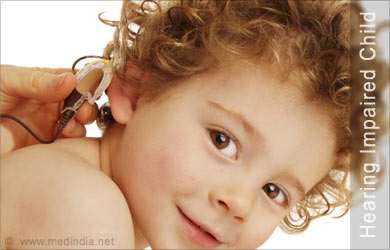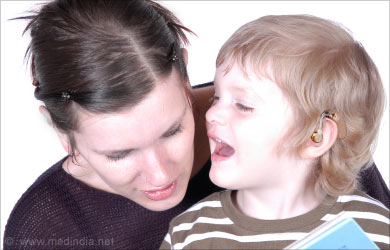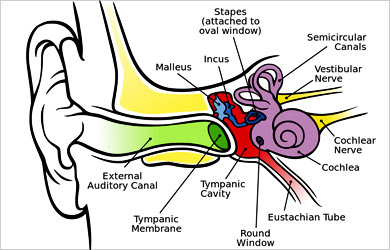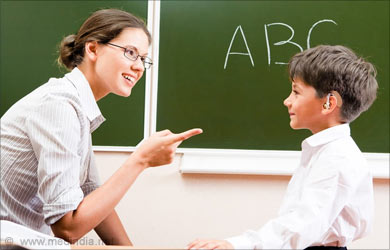- Effects of Hearing Loss on Development - (http://www.asha.org/public/hearing/effects-of-hearing-loss-on-development/)
- ENHANCING COMMUNICATION WITH HEARING IMPAIRED CHILDREN AND WEARERS OF HEARING AIDS - (http://www.aussiedeafkids.org.au/enhancing-communication-with-hearing-impaired-children-and-wearers-of-hearing-aids.html)
- Prelingual deafness - (http://en.wikipedia.org/wiki/prelingual_deafness)
- Ask A Linguist FAQ - (http://linguistlist.org/ask-ling/lang-acq.cfm)
About
All of us learn a language, whether first or second, by Hearing, listening and understanding the speech sounds produced and the manner in which words are woven into a sentence. The context, situation and the use of right words are all very important parts of language acquisition. But the most important input of a new language is through hearing. When this is shut off, the speech and language skills get hit the most.

Acquiring Speech and Language
Acquiring language can be like playing a new game, where one has to learn the game only by participating and understanding the rules of the game. And this game of language acquisition can only be learnt by hearing, listening, imitating the use of words and incorporating the rules of language. Scientists agree that humans have an innate ability to learn language and this is much more predominant during the first 2 years of life, extending up to about 14 years. Children learn to imitate adults in every possible way and this is true in language learning also. The manner of their speech, sentences they use, accent and the vocabulary all depend on what they have heard from the adults they are surrounded with.

Speech and language are two different things to be learnt by the child, but the two are related. Learning speech involves recognizing the right pronunciation, voice modulations and fluency. Learning language involves use of the right words, in the right grammatical sequence and meaningfully in a context.
Hearing and Listening
The human hearing system consists of a complex pathway that involves membranes, muscles, bones, fluids, sensory receptors and nerves. When the sounds eventually reach the brain, the characteristics and combinations are interpreted by the brain as speech. The hearing system is comprised of the outer ear, middle ear, inner ear and the auditory pathways and centers of the brain. The sound travels through the outer ear via the ear canal, reaches the middle ear and is transmitted by the little bones of the middle ear to the inner ear. Here the sensory receptors pick the sound vibrations and transmit through the auditory nerve to the brain.

When one of these parts of the auditory pathway is affected and there is a diminished hearing capacity, it is called hearing loss, or more commonly hearing impairment. Depending upon the area of impact, the hearing loss is categorized as conductive hearing loss (middle ear), sensorineural hearing loss (inner ear or the auditory nerve) or auditory processing hearing disorders. Further, the hearing loss can be of various levels of severity, namely, Mild hearing loss, Moderate hearing loss, Severe hearing loss and Profound hearing loss, which forms another basis of categorization. Equipped with the knowledge and understanding about this severity of hearing loss, one can determine the amount of residual hearing that will help in the rehabilitation programme of the child.
Effect of Hearing Loss on Speech and Language Development
Language acquisition is very much dependent on the hearing capacity of the child. Hence, the various factors affecting the speech and language development in a child with hearing impairment include age of onset of hearing loss, the severity, early intervention and accompaniment of other disabilities in the individual. Since the child is not able to hear speech and listen to the language, the earlier the onset of hearing loss, the more is the delay in language acquisition. However, if the hearing loss is identified early and intervention is begun, the language can be learnt on time. The intervention can be started even with a newborn child diagnosed as hearing impaired.
The vocabulary development is much slower in a child with hearing loss than a normal hearing child. Concrete words like ball, dog, table, etc are understood more easily than abstract words like jealous, equal, etc. Functional words like articles, prepositions, conjunctions are also difficult to understand and more formal training is required for the rules to be incorporated in their language. Words with multiple meanings could be confusing for the hearing impaired child. For example, "star" could mean the star of the night sky or a reference to a celebrity.

The speech clarity of a child with hearing impaired is often different from a hearing child. These children do not hear the sounds they speak. Quiet speech sounds like ‘f’, ‘k’, ‘sh’ and‘s’ are not heard by them. So, the word “stake” and “take” seem similar to them. Pronouncing these sounds may also be affected and consequently their speech may not sound clear. The loudness levels may not be appropriate and the speech may sound monotonous without the required stress on particular words, the right intonations and slow rate of speech flow.
The sentence structure of a child with hearing impairment may usually be shorter and simpler than those of a hearing child. They may have difficulty in understanding complex sentences and thus the writing skills will also be affected. They may have difficulty in hearing sounds in words ending with –ed or –s. This can affect the use of words describing past tense, plurals, subject-verb agreement and also possessives.
Speech and Language Intervention in a Child with Congenital Hearing Loss
The first step in introducing the hearing-impaired child towards speech and language is identifying the severity of hearing loss and determining the residual hearing capacity, and eventually fitting with the right kind of hearing aid. Cochlear implants can be recommended to those who can benefit from it. There are various approaches to help with speech and language acquisition for children fitted with hearing aids and cochlear implants. Training them and their parents to use and maintain the hearing aids is a must for the effectiveness of the intervention program.
Based on the severity of the hearing loss, the residual hearing capacity of the child can be used to the maximum possible extent. The child needs to be trained to identify sounds, discriminate background from the speech sounds and also understand differences in the sounds that appear alike. Training the child in Speech reading or Lip reading can help the child to pick up the skills in a better way and also communicate well in the talking world. The child must be made aware of the sounds, pronunciation, intonation patterns used and also use the right kind of voice quality and intensity. The child must also learn conversational skills like waiting for their turn to talk, maintaining the context, initiating and maintaining conversations, responding to questions or situations, facial expressions and maintaining eye contact.

Professional help in Identification and Intervention for a Child with Hearing Impairment
The parents may be advised by the family physician to seek a specialist’s help when the doctor is in doubt of a proper diagnosis regarding the hearing loss. The Otolaryngologist or the ENT specialist can help to identify and assess the hearing impairment and assess the possibility of repairing any damage. The parents are then guided by the Audiologist about the extent of hearing impairment, who also determines the amount of residual hearing ability and the right kind of hearing aid for the child. The Speech therapist now takes over and a long process of speech and language therapy along with auditory training follows. The candidates suitable for a cochlear implant can be surgically fitted with the same by the ENT surgeon and the follow-up auditory and speech training is carried on with the qualified Audiologist and Speech Therapist.
Speech and language is not the only management required for the child with hearing loss. The overall development includes improving cognitive skills, dealing with the feelings of odd-one out, emotional development, social skills and many other related areas. The programme must be such that it helps the child to be more confident, expressive and feel integrated into the talking world.









